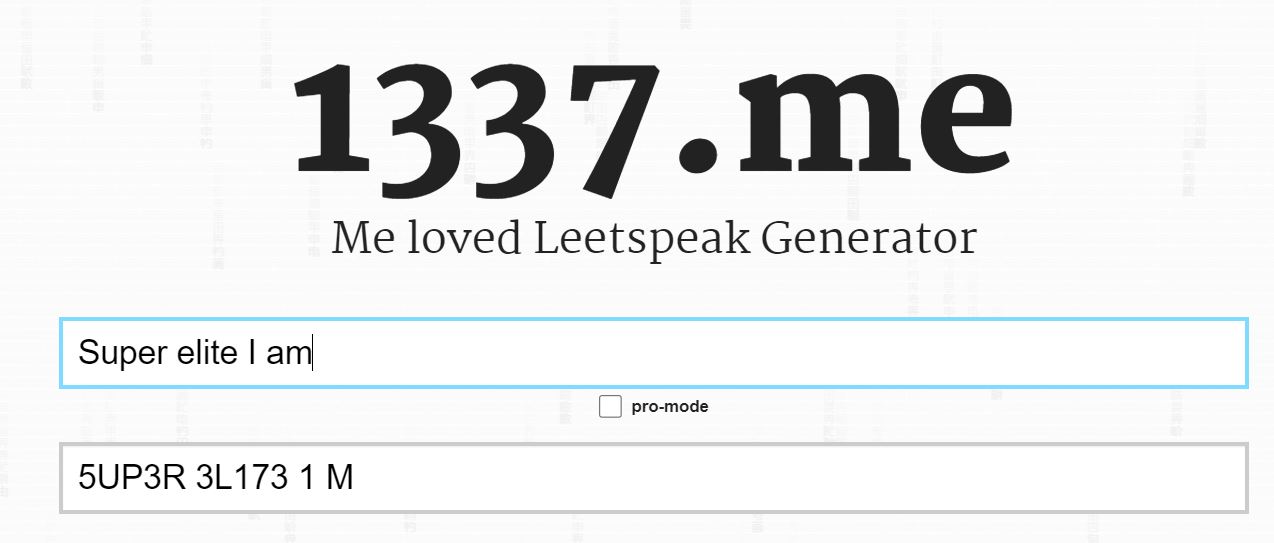 You’ve probably seen leetspeak, also known as 1337 or “l33t,” somewhere on the Internet or in a movie about computer hacking. It’s essentially regular English, but with more hacker slang and with certain letters changed to numbers.
You’ve probably seen leetspeak, also known as 1337 or “l33t,” somewhere on the Internet or in a movie about computer hacking. It’s essentially regular English, but with more hacker slang and with certain letters changed to numbers.
Leetspeak – An Origin Story
Developed in the early 1980s, leetspeak actually predates the World Wide Web by nearly a decade. It started on Bulletin Board Systems when the Internet was first developing and only people with elite status could access certain content. That content often included information that those elites didn’t want anyone outside their circles to find.
Outsmarting the System
In those days, search functions scanned for specific keywords to identify their targets. Early hacker communities figured out that changing a few of the letters within a word could throw the search engines off the proverbial scent. By using “h3ll0” for “hello,” for example, they could protect the privacy of their content while keeping it readable among themselves.
The Mark of an “3l33t”
As leetspeak became more well-known, gamers began to use it to present themselves as high status. The phrase “1 4m 3l33t!” (or, “I am elite!”) became a popular way for both gamers and hackers to show that they had reached the top of the pack.
Levels of L33t
Th1s s3nt3nc3 1s wr1tt3n 1n b4sic l33t. (“This sentence is written in basic leet.”)
It’s pretty understandable, even to someone who isn’t well versed in the world of computer hacking. All you do is get rid of vowels and substitute numbers that look similar.
The Next Step
Intermediate-level leet starts to get the consonants involved, and it looks “50meth1n9 l1k3 th15.” It’s more challenging to read than basic leet but still decipherable, particularly to eyes and brains that are already familiar with the basic form. A 5 looks enough like an S, for example, that a reader can go from “is” to “1s” to “15” without excessive confusion.
Advanced Leet
Advanced leet brings in yet more replacements, including more replacements per letter.
If you read a message in basic or intermediate leet, the replacement for the letter E will almost always be the number 3. Once you get into advanced leet, however, you have a lot more options. You can still indicate E using 3, but you can also use &, €, ë, and even |=-. Just the word leet has dozens of possible translations, from the classic l33t to |_&€”|”.
Your Basic L33t Vocabulary
As with any dialect, there are words that anyone who is “in the know” has to have in their vocabulary. Many of them have to do with status. (Specifically, the speaker being of a higher status than others.)
“Pwn”
“Pwn” is one of the most popular leetspeak words in hacker culture. It’s an intentional typo of “own,” a word that the early hackers of the 80’s used to mean taking over control of another computer.
Urban legends offer a number of explanations for how the shift from “own” to “pwn” happened. Some say that it has always been an intentional misspelling, while others say that it was an honest mistake that took off in common usage.
In either case, it’s become a popular way to express your victory or defeat. While you can definitely “pwn” someone, it’s also common to admit that you “g0t pwned.” It’s usually pronounced “got poned.”
“N00b”
N00b, or “noob” in non-leetspeak, is a shortened form of “newbie.” Programmers and hackers started calling people “newbies” around the same time that they started “owning” each others’ systems. And like “own,” the word newbie evolved into noob and n00b.
The new spellings are specifically derogatory. Being a “newb” simply means that you’re new at something, which is perfectly fine in and of itself. If someone’s calling you a “n00b” or “noob,” however, that usually means that they think you’re not only new or unskilled but also disrespectfully content to be ignorant.
Haxor
Like the first leetspeak words, “haxor” expresses the speaker’s claim to the hacking community. It literally means “hacker” or even “to hack.”
The term “haxor” usually refers to a particularly advanced hacker (or haxor) and may even be used in reference to leetspeak itself. For example, “that haxor always types haxor.”
Leetspeak Out in the World
Even now, leetspeak continues to evolve and make its way into new corners of our perpetually connected society. Google even uses it to communicate with members of the general public, but with an insider nod to hacker culture.
Google’s Bug Bounty
The Google Vulnerability Reward Program (VRP), known colloquially as its “bug bounty,” offers rewards to users who can identify and draw Google’s attention to security vulnerabilities that can compromise user data.
If a user finds such a vulnerability in a qualifying Google site, the specifics of which are detailed on the VRP website, Google will offer a financial reward. Reward amounts range from $100 to $31,337. Remove the comma and the dollar sign from that maximum amount and you have “31337.”
Or, in non-leetspeak, “eleet.”
Hacker Movies
Hacker culture even has its own filmography. A quick Google search for “hacker movies” will give you lists of what dozens of people believe to be the best. Popular titles include:
- Untraceable (2008)
- The Italian Job (2003)
- The Matrix (1999)
- Hackers (1995)
One recent example is the movie adaptation of the novel Ready Player One, the story of one gamer’s search for the industry’s biggest “Easter egg.” The book and the movie both include characters with leetspeak names.
These characters are employees of the big bad corporation, IOI. They are known as the “suxorzs,” or the “sux0rz.” The word is a leetspeak translation of “sixers,” a nickname given because of their avatar names are also their six-digit employee numbers. It is also the leetspeak term for “this sucks.”
Leetspeak and You
Some people take to leetspeak like a natural second language. These are the people who might go on to pursue a career in hacking – and yes, it is possible. Even legal.
The first step is training in cybersecurity and penetration testing. Through professionally designed courses, like those offered by Cerberus Sentinel, you can learn the techniques that hackers – sorry, haxors – use to access today’s systems.
Go ahead – build a career that will let you pwn the h4x0rs. Also, develop some people skills while you’re at it – read my book “The Smartest Person in the Room” to learn how.












